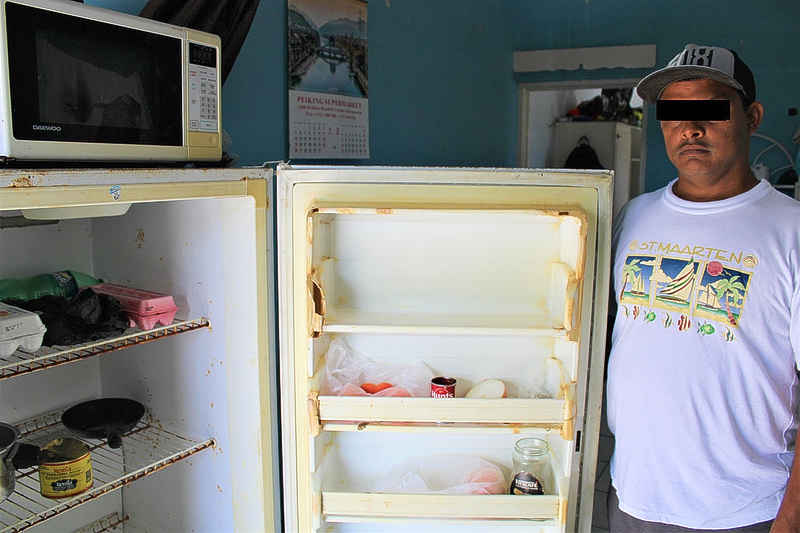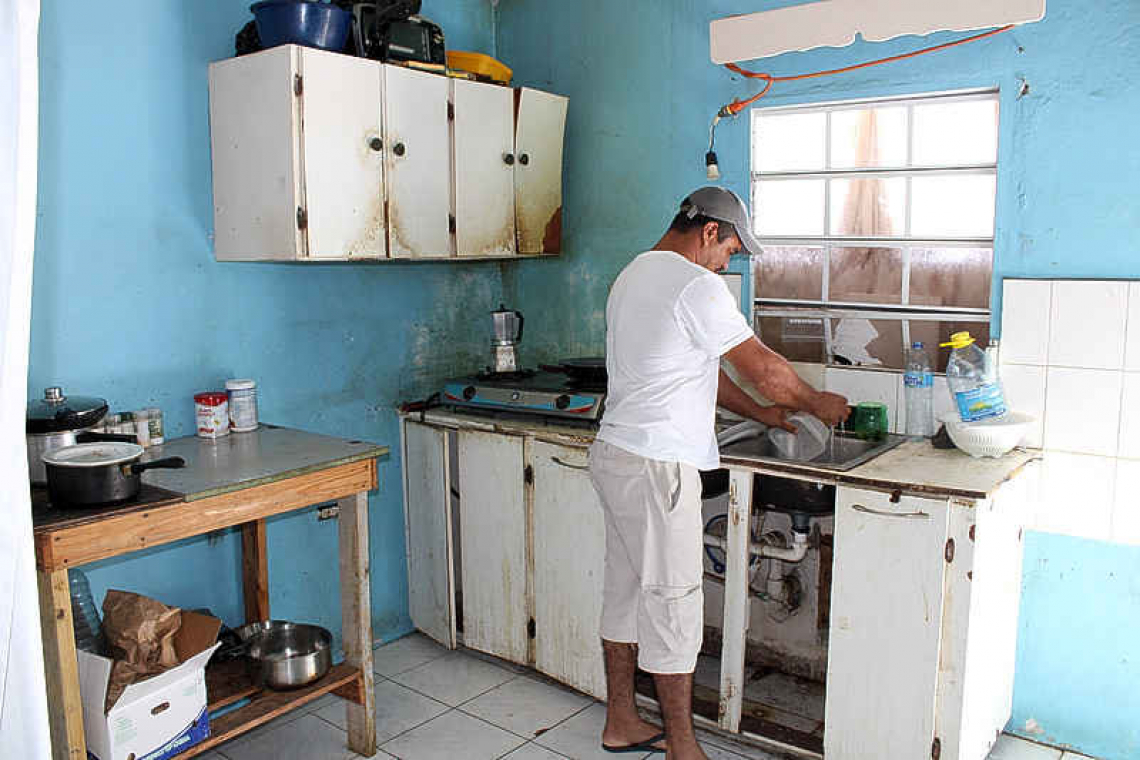One of the homes where several migrants live in Cole Bay
PHILIPSBURG--Venezuelans fleeing the crisis in their country end up in St. Maarten in shanty towns, on the street, in a brothel – or in jail, after which they are deported. The government of St. Maarten forces them to pay their deportation cost themselves; if they cannot, a long stay in the cell awaits them.
Many penniless Venezuelans – the average monthly wage in Venezuela is US $25 – cannot afford the cost of a return flight. In fact, to get to St. Maarten they have put themselves deep into debt with people-smugglers and illegal bankers by borrowing money for the trip at usury rates of 30 to 40 per cent.

Migrant showing empty fridge
Statements of Venezuelans in St. Maarten to this newspaper are confirmed by the latest report of the Kingdom Detective Cooperation Team RST, an update of the Crime Picture Analysis 2022-2023. “In Punto Fijo and Coro [In the northern province of Falcon – Ed.] money is borrowed so that people can leave. There are at least three so-called travel agencies that sell ‘travel packages’ to Aruba, Curaçao and St. Maarten.”
Amounts range from $1,000 to $2,000. “The amounts are recorded in a debt statement with monthly payments at interest rates of sometimes as much as 40 per cent,” the RST writes. “In the event of non-payment, there is a threat of reprisals against family and friends in Venezuela. In fact, debtors are forced to stay in countries until the loan is paid off.”
According to the detectives, it does not take much imagination to think that these refugees can fall prey to traffickers. “Victimisation or criminal exploitation is also possible to imagine. In that case, they are forced to commit criminal offences for others; for example, the provision of hand and span services for criminal networks.”
A large number of Venezuelans in St. Maarten came to St. Maarten shortly after the destruction of the island by Hurricane Irma in September 2017 in the hope of finding paid work in the reconstruction of the island. Seeing the benefit of the US dollar over the Antillean guilder, Venezuelan electricians, carpenters and pipefitters in Curaçao also boarded planes to St. Maarten at the start of 2018.
Two years later, the airport is virtually closed to Venezuelans. Without much publicity, a visa requirement for Venezuelans was introduced on April 1, 2020, at the end of the two-week COVID-19 lockdown in St. Maarten. This visa requirement applies to all islands in the Caribbean part of the Kingdom.
The visa requirement and the COVID-19 crisis have certainly had an impact on migration, writes the RST, “but the networks and facilitators involved in this have quickly adapted to the changed circumstances and the demand for their services has increased rather than decreased. Uncertainty about mobility restrictions has in all likelihood driven up both demand and cost.”
As the Dutch Caribbean countries are still doing better than many neighbouring countries despite the poor economic situation, it is to be expected that the migration problem, especially for Venezuelan refugees, is far from over, the RST concludes.
“It is noted that human trafficking has gone even more underground and that local victims seem to be involved more often. The work terrain of Venezuelan ‘trago-girls’ in Curaçao and Aruba has been moved from snèks [local bars] to homes. This poses more risks for the women because there is no social control at all.”
In 2018, the relatively small group of Venezuelans in St. Maarten consisted almost exclusively of single men ages 25-55. After the amount of construction work in St Maarten decreased more and more in the course of 2019, many dozens of Venezuelans decided to return to their families in Venezuela just before Christmas, bringing with them the money they had earned.
A group of men who lived on the terrain next to the dump on Pond Island started packing, except for a few. One of the laggards was Stuart Sanoja. He was afraid to leave with his friends because he had a residual debt with the illegal bankers who had lent him $1,500 for his ticket to St. Maarten, an amount that he had to repay with 30 per cent interest.
As a skilled electrician, Sanoja had almost continuous work in St. Maarten, but after some local exploiters refused to pay him, he could not meet the monthly repayments to his illegal lenders. He feared more threats. “If I don’t pay off my debt in full, they will not only find me in St. Maarten, but also my wife and children in Venezuela, or other family members will be extorted.”
Since the beginning of the pandemic, Sanoja has been unemployed at times and sat with no money and no food in a shack on the terrain next to the dump. In the beginning of 2021, he finally managed to pay off his debt. After he had saved money, he decided to leave St. Maarten.
With a ticket and $1,200 cash in his pocket, he entered Princess Juliana International Airport in September 2021. He said he got the fright of his life at passport control: the extension of his passport that he had applied for and paid for from St. Maarten turned out to be invalid.
He was taken by the police to the police station in Philipsburg, where he stated that he did not know that his passport was invalid. The St. Maarten Police Force fined him $500, which he paid immediately. The police then took him into custody.
“A nightmare,” said Sanoja, who describes the conditions in the police cells as “inhumane.” “The heat and sweat don’t let you sleep. There are some small mattresses that have a bad smell and are very dirty. I preferred to sleep on the floor because those mattresses have many years there and it smells very bad.”
There is no ventilation in the cells, Sanoja said. “The heat is as if you were in a sauna.” He became overwhelmed. “You do not know when it is day or night. The mind goes crazy, you just think about what time it is and when they bring food.”
After eight days of detention, he landed in Caracas with $70 left in his pocket. “After I paid the fine, I still had $700 in cash. The police then bought a plane ticket and paid for a COVID-19 test for me. In Caracas I paid for the bus and after a long journey arrived in my hometown almost without money.”
Sanoja cannot return to St. Maarten, but is desperate to leave Venezuela, where life is brutal and life-threatening, according to him. The situation in his hometown in the north of Venezuela deteriorated significantly during the time he stayed in St. Maarten, said Sanoja. “Working in St. Maarten, I have always managed to support my family. But I don’t know how to feed my children now, and it’s not safe here.”
“Venezuela has become a narco-state where drug cartels and international criminal organisations now run part of the country with allies that include high-ranking military officials, politicians and state governors. This means that now we observe a regionalisation of crime and insecurity,” the Advisory Council on International Affairs (AIV) noted in its 2020 report. This has led to an increasing number of regional and local criminal networks.
“Zulia and Falcon, the two regions closest to the Leeward Islands, are lawless states that are hardly governed anymore.”
Research organisation InSight Crime stated: “The collapse of Venezuela, where transnational organised crime has now penetrated the highest echelons of government, presents the Kingdom of the Netherlands with a direct national security threat.”
The country has fallen into a free fall, the RST concludes. “This means that the flow of refugees has continued unabated after a short break during the lockdowns. The poor economic situation on the islands makes it difficult for migrants and crime is easier than finding a legal source of income.”







